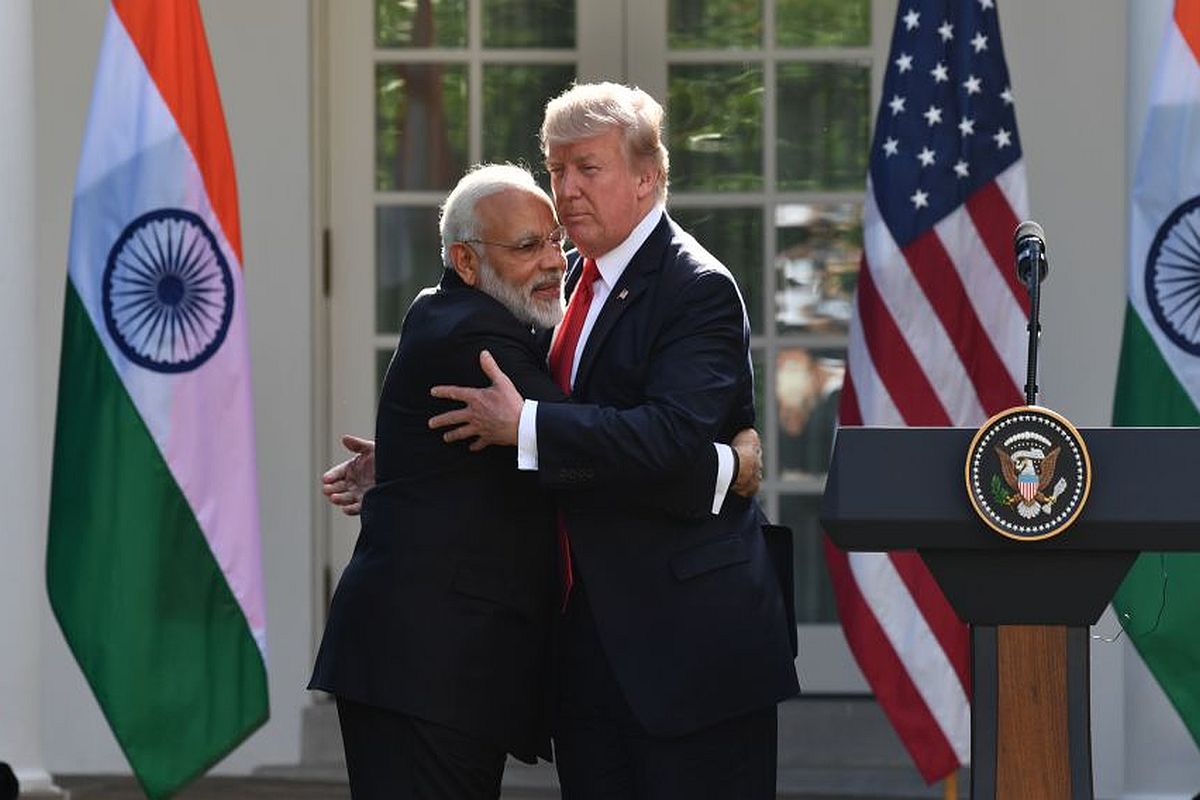Congress, allies sabotaged Jammu’s national projects: Dr Jitendra Singh
The minister further alleged that the Congress also denied 4% reservation to the people living along the International Border in this region.
The influential senators Chris Van Hollen, Todd Young, Richard J Durbin and Lindsey O Graham, in their letter to Secretary of State Mike Pompeo dated February 12, said that India has now imposed the longest-ever internet shutdown by a democracy, disrupting access to medical care, business and education for seven million people.

Prime Minister Narendra Modi hugs US President Donald Trump during his visit to America in July, 2017. (File Photo: AFP)
Ahead of the US President Donald Trump’s India visit later this month, four powerful US Senators have written to US Secretary of State Mike Pompeo and asked for an assessment of the human rights situation in Kashmir and religious freedom in the country, saying hundreds of Kashmiris remain in “preventive detention”after the abrogation of Article 370. The top senators also expressed concerned about the recently passed Citizenship Amendment Act (CAA) which has triggered nationwide protest in India.
The influential senators Chris Van Hollen, Todd Young, Richard J Durbin and Lindsey O Graham, in their letter to Secretary of State Mike Pompeo dated February 12, said that India has now imposed the longest-ever internet shutdown by a democracy, disrupting access to medical care, business and education for seven million people.
On August 5 last year, the Centre had withdrawn the special status given to Jammu and Kashmir under Article 370 of the Constitution and divided the state into two Union Territories — Ladakh and Jammu and Kashmir.
Advertisement
The two Union Territories came into existence on October 31 last year.
Severe curbs including movement of people as well as on mobile telephone and internet connectivity was imposed in the valley. The crackdown drew international criticism with several countries expressing concerns over the situation in Kashmir.
Several political leaders were picked up from their residences on August 5 last year, with the three former chief ministers Farooq Abdullah, Omar Abdullah and Mehbooba Mufti and several other leaders still continue to remain under detention and are now facing stringent Public Safety Act (PSA). Under PSA a person can be kept under detention without trial for up to two year.
India has categorically told the international community that its move to scrap Article 370 was an internal matter. According to officials, internet is being restored in the Valley in a phased manner after reviewing the security situation.
The US lawmakers, describing themselves as “longtime friends of India”, wrote in the letter that “more than six months after Indian Prime Minister Narendra Modi’s government unilaterally revoked the autonomy of Jammu and Kashmir, the government continues to block most internet in the region”.
“Hundreds of Kashmiris remain in ‘preventive detention’, including key political figures,” they said.
“In addition, the Indian government has taken other troubling steps that threaten the rights of certain religious minorities and the secular character of the state. This includes the passage of the controversial Citizenship Amendment Act which is being challenged in India’s Supreme Court,” the Senators wrote.
In the letter, the Senators requested Pompeo for a State Department assessment of a number of issues in India including the number of individuals detained by the government for political purposes and their treatment; current restrictions on communications in Jammu and Kashmir; current accessibility of Jammu and Kashmir; and restrictions on religious freedoms in Jammu and Kashmir.
According to the senators, the actions taken by the Indian government in Jammu and Kashmir, have severe consequences. That is why, in the Fiscal Year 2020 State, Foreign Operations, and Related Programmes appropriations report, the Congress urged India to fully restore telecommunications and internet services, lift its lockdown and curfew and release the individuals detained pursuant to the Indian government’s revocation of Article 370 of the Constitution.
The US President is slated to travel to India on February 24 and 25 at the invitation of Prime Minister Narendra Modi. In addition to New Delhi, he will make a stop in Ahmedabad in Gujarat to address a joint public meeting with PM Modi at a stadium.
Taking to Twitter, PM Modi said that he is “delighted” that Trump and his wife will be visiting Delhi this month and added, “India will accord a memorable welcome to our esteemed guests”.
“This visit is a very special one and it will go a long way in further cementing India-USA friendship,” he tweeted.
Meanwhile, the second batch of foreign envoys on Wednesday arrived in Srinagar for a scheduled visit to the valley.
The batch had 25 foreign envoys, including ambassadors from Germany, Canada, France, New Zealand, Mexico, Italy, Afghanistan, Austria, Uzbekistan, Poland, Czech Republic, Bulgaria, Hungary as well as envoys of the European Union (EU). The Centre had said the two-day trip of the MEPs to Kashmir was like a “familiarisation visit”.
According to the CAA, members of Hindu, Sikh, Buddhist, Jain, Parsi and Christian communities who have come from Pakistan, Bangladesh and Afghanistan till December 31, 2014 following religious persecution there will get Indian citizenship.
Defending the CAA, Prime Minister Narendra Modi last month said that the law is not about taking away citizenship, it is about giving citizenship.
“We must all know that any person of any religion from any country of the world who believes in India and its Constitution can apply for Indian citizenship through due process. There’s no problem in that,” he said.
Advertisement